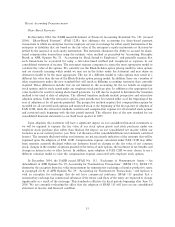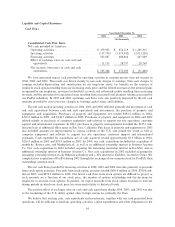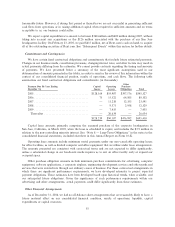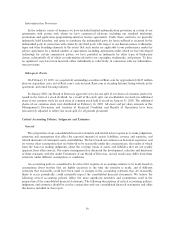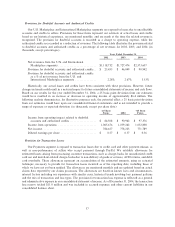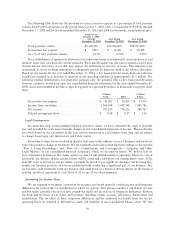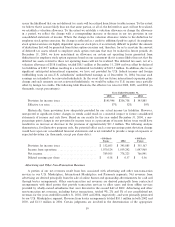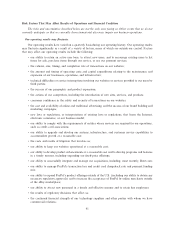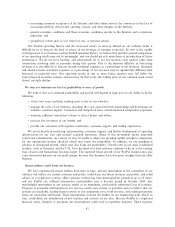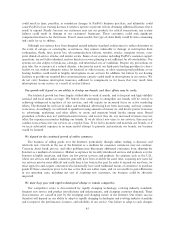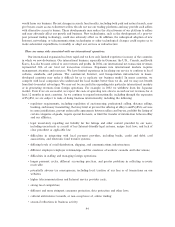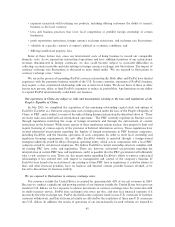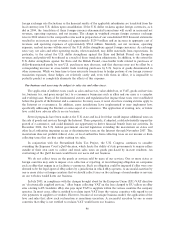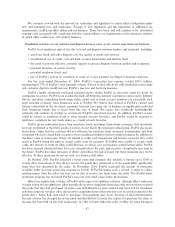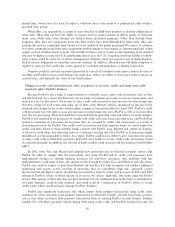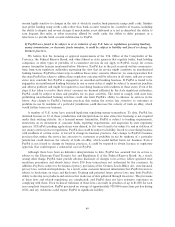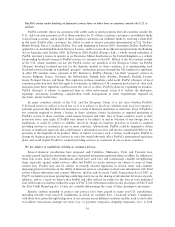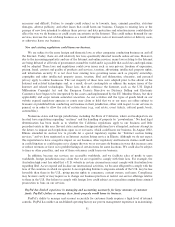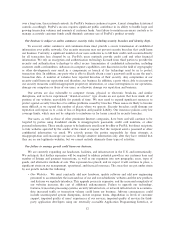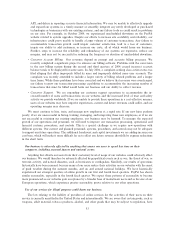eBay 2004 Annual Report Download - page 45
Download and view the complete annual report
Please find page 45 of the 2004 eBay annual report below. You can navigate through the pages in the report by either clicking on the pages listed below, or by using the keyword search tool below to find specific information within the annual report.could result in Ñnes, penalties, or mandatory changes to PayPal's business practices, and ultimately could
cause PayPal to lose existing licenses it needs to operate or prevent it from obtaining additional licenses that it
needs to expand. Finally, because our customers may use our products for critical transactions, any system
failures could result in damage to our customers' businesses. These customers could seek signiÑcant
compensation from us for their losses. Even if unsuccessful, this type of claim likely would be time consuming
and costly for us to address.
Although our systems have been designed around industry-standard architectures to reduce downtime in
the event of outages or catastrophic occurrences, they remain vulnerable to damage or interruption from
earthquakes, Öoods, Ñres, power loss, telecommunication failures, terrorist attacks, computer viruses, com-
puter denial-of-service attacks, and similar events. Some of our systems, including PayPal's customer support
operations, are not fully redundant, and our disaster recovery planning is not suÇcient for all eventualities. Our
systems are also subject to break-ins, sabotage, and intentional acts of vandalism. Despite any precautions we
may take, the occurrence of a natural disaster, a decision by any of our third-party hosting providers to close a
facility we use without adequate notice for Ñnancial or other reasons, or other unanticipated problems at our
hosting facilities could result in lengthy interruptions in our services. In addition, the failure by our hosting
facilities to provide our required data communications capacity could result in interruptions in our service. We
do not carry business interruption insurance suÇcient to compensate us for losses that may result from
interruptions in our service as a result of system failures.
Our growth will depend on our ability to develop our brands, and these eÅorts may be costly.
Our historical growth has been largely attributable to word of mouth, and to frequent and high visibility
national and local media coverage. We believe that continuing to strengthen our brands will be critical to
achieving widespread acceptance of our services, and will require an increased focus on active marketing
eÅorts. The demand for and cost of online and traditional advertising have been increasing, and may continue
to increase. Accordingly, we will need to spend increasing amounts of money on, and devote greater resources
to, advertising, marketing, and other eÅorts to create and maintain brand loyalty among users. Brand
promotion activities may not yield increased revenues, and even if they do, any increased revenues may not
oÅset the expenses incurred in building our brands. If we do attract new users to our services, they may not
conduct transactions over our services on a regular basis. If we fail to promote and maintain our brands, or if
we incur substantial expenses in an unsuccessful attempt to promote and maintain our brands, our business
would be harmed.
We depend on the continued growth of online commerce.
The business of selling goods over the Internet, particularly through online trading, is dynamic and
relatively new. Growth in the use of the Internet as a medium for consumer commerce may not continue.
Concerns about fraud, privacy, and other problems may discourage additional consumers from adopting the
Internet as a medium of commerce. Market acceptance for recently introduced services and products over the
Internet is highly uncertain, and there are few proven services and products. In countries such as the U.S.,
where our services and online commerce generally have been available for some time, acquiring new users for
our services may be more diÇcult and costly than it has been in the past. In order to expand our user base, we
must appeal to and acquire consumers who historically have used traditional means of commerce to purchase
goods. If these consumers prove to be less active than our earlier users, and we are unable to gain eÇciencies
in our operating costs, including our cost of acquiring new customers, our business could be adversely
impacted.
We must keep pace with rapid technological change to remain competitive.
Our competitive arena is characterized by rapidly changing technology, evolving industry standards,
frequent new service and product introductions and enhancements, and changing customer demands. These
characteristics are caused in part by the emerging and changing nature of the Internet. Our future success
therefore will depend on our ability to adapt to rapidly changing technologies and evolving industry standards
and to improve the performance, features, and reliability of our service. Our failure to adapt to such changes
43


